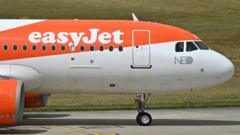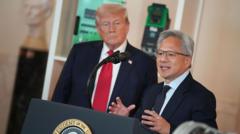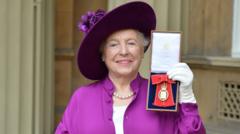What Happened to the EasyJet Pilot in the Drunk and Naked Incident?

Understanding the Responsibilities and Conduct of Airline Pilots
The aviation industry is built on trust, safety, and professionalism. Pilots play a critical role in ensuring that passengers reach their destinations safely and efficiently. However, incidents like the recent suspension of an EasyJet captain highlight the importance of adhering to strict conduct guidelines. This article will explore the responsibilities of airline pilots, the implications of misconduct, and the protocols airlines follow when such incidents occur.
The Role of a Pilot in Commercial Aviation
A commercial pilot's primary responsibility is to operate an aircraft and ensure the safety of all onboard. This includes not only flying the aircraft but also managing various operational tasks such as pre-flight checks, navigation, and communication with air traffic control. Pilots must also be prepared to handle emergencies effectively, which requires a high level of alertness and professionalism.
In addition to technical skills, pilots must exhibit strong decision-making abilities, leadership, and interpersonal communication skills. They are often tasked with making quick decisions in high-pressure situations, which can significantly impact the safety and comfort of passengers and crew. This is why maintaining a professional demeanor, both in and out of the cockpit, is essential.
Industry Standards for Pilot Conduct
The aviation sector has established rigorous standards for pilot conduct, which are enforced by both airlines and regulatory bodies. These standards are designed to maintain high safety levels and ensure that pilots are fit for duty. Here are some key aspects of pilot conduct:
- Substance Abuse Policies: Airlines typically have strict policies regarding the consumption of alcohol and drugs. Most airlines enforce a "bottle to throttle" rule, prohibiting pilots from consuming alcohol within a specified number of hours before a flight.
- Professionalism: Pilots are expected to conduct themselves in a manner that reflects the professionalism of the airline. This includes dressing appropriately, maintaining good hygiene, and behaving respectfully in public.
- Health and Fitness: Pilots must pass regular medical examinations to ensure they are physically and mentally fit to fly. Any issues that could impair their ability to operate an aircraft are taken seriously.
The Consequences of Misconduct
When a pilot is found to have violated conduct standards, the consequences can be severe. In the case of the EasyJet captain who was suspended for inappropriate behavior, several factors come into play:
Immediate Suspension
Airlines typically act swiftly in response to allegations of misconduct. The EasyJet pilot was immediately suspended pending an investigation, reflecting the airline's commitment to safety and professionalism. This quick action serves to reassure passengers and the public that the airline takes such incidents seriously.
Investigation Process
Following a suspension, an internal investigation is usually conducted to gather all relevant facts. This may involve interviewing witnesses, reviewing security footage, and examining the circumstances surrounding the incident. The goal is to ensure a thorough understanding of what transpired and to determine appropriate disciplinary action.
Potential Outcomes
Depending on the investigation's findings, various outcomes may arise:
- Reinstatement: If the investigation concludes that the pilot acted inappropriately but did not pose a direct threat to safety, they may be reinstated after a period of counseling or additional training.
- Termination: In cases of severe misconduct or repeated violations, the pilot may face termination. This outcome sends a strong message about the airline's commitment to safety and professionalism.
- Legal Action: In some instances, the airline or individuals involved may pursue legal action, especially if the pilot's behavior caused harm or distress.
Public Perception and Trust in Airlines
Incidents involving pilot misconduct can significantly impact public perception and trust in an airline. Passengers expect to entrust their safety to professionals who adhere to high standards of conduct. When those expectations are violated, it can lead to a loss of confidence among customers.
Maintaining Customer Trust
To maintain customer trust, airlines must be transparent about their policies and the actions they take in response to incidents. Communicating openly can help reassure passengers that their safety is the airline's top priority. For instance, EasyJet's prompt response to the situation and their statement emphasizing safety reflects their dedication to maintaining public trust.
Impact on Business
Beyond immediate public perception, misconduct can have financial implications for airlines. Negative publicity can lead to decreased ticket sales and customer loyalty. Furthermore, regulatory scrutiny can increase, resulting in potential fines or operational restrictions.
Best Practices for Airlines in Managing Pilot Conduct
To effectively manage pilot conduct and ensure safety, airlines can adopt several best practices:
- Regular Training: Implementing ongoing training programs focused on professionalism, ethics, and substance abuse awareness can help reinforce the importance of proper conduct.
- Clear Policies: Establishing clear conduct policies and ensuring all employees are familiar with them can minimize the risk of misconduct.
- Support Systems: Providing support systems for pilots, such as counseling and mental health resources, can help maintain their well-being and prevent incidents of misconduct.
The Future of Airline Safety and Pilot Conduct
As the aviation industry continues to evolve, the emphasis on safety and professionalism will remain paramount. Airlines will need to adapt to changing societal norms and expectations regarding pilot conduct. This may include developing new training programs and updating policies to address emerging issues.
Technological Innovations
Emerging technologies, such as AI and data analytics, can play a role in enhancing safety protocols. For example, predictive analytics could help identify potential issues before they escalate. By leveraging technology, airlines can improve their ability to monitor pilot behavior and ensure compliance with conduct standards.
Collaboration with Regulatory Bodies
Collaboration between airlines and regulatory bodies will also be crucial in shaping the future of pilot conduct. By working together to establish and enforce standards, the industry can enhance safety and maintain public trust. This collaborative approach can lead to the development of best practices that prioritize the well-being of passengers and crew.
Conclusion
In conclusion, the responsibilities of pilots extend far beyond merely flying an aircraft. Their conduct, both in and out of the cockpit, is vital to ensuring the safety and trust of passengers. Airlines must take incidents of misconduct seriously, implementing rigorous policies and training programs to uphold industry standards. As the aviation landscape continues to change, the commitment to safety and professionalism will remain at the forefront. How can airlines further enhance their protocols to ensure pilots meet the highest standards of conduct? #AviationSafety #PilotConduct #EasyJet
FAQs
What are the consequences of a pilot being found drunk before a flight?
If a pilot is found to be under the influence of alcohol or drugs before a flight, they may face immediate suspension, an internal investigation, and possible termination depending on the severity of the incident.
How do airlines ensure pilots adhere to conduct standards?
Airlines implement strict policies, conduct regular training programs, and provide support systems to ensure pilots understand and adhere to conduct standards.
What is the 'bottle to throttle' rule?
The 'bottle to throttle' rule is a regulation that prohibits pilots from consuming alcohol within a specified number of hours before operating an aircraft, typically 8 hours.
Published: 2025-08-11 10:28:13 | Category: technology



